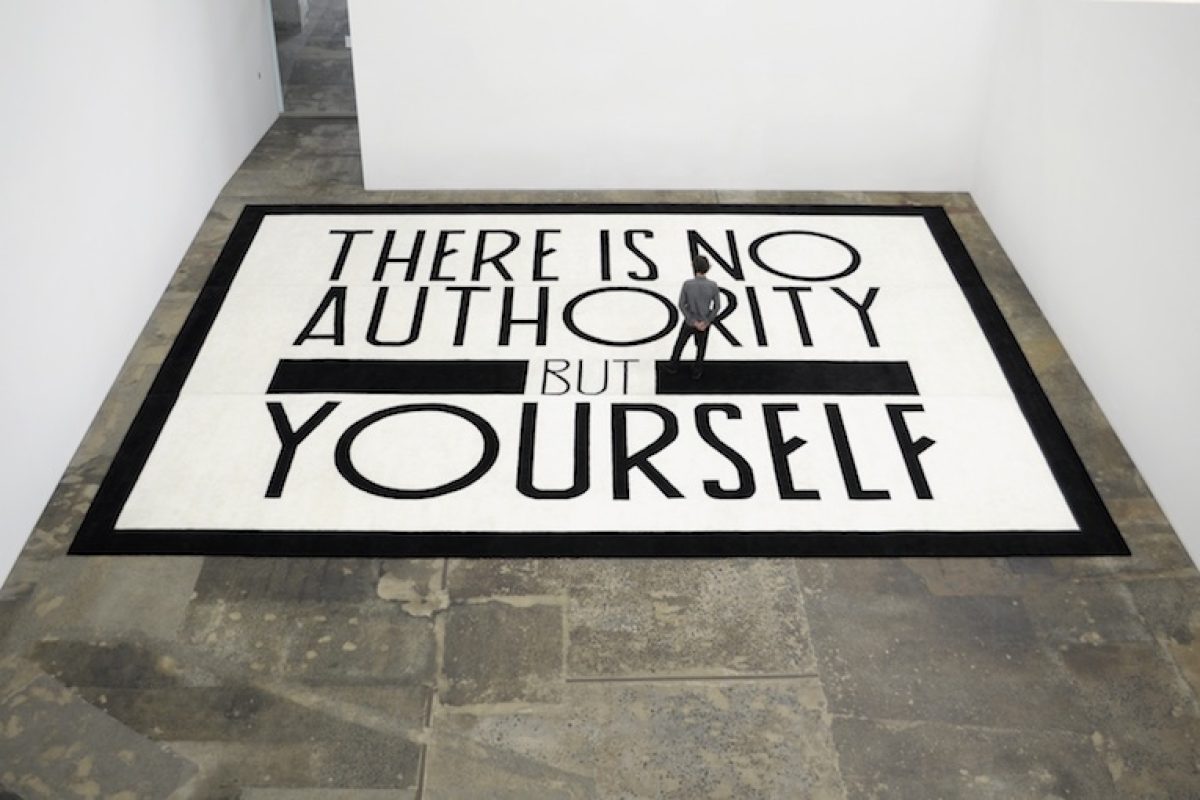Marco Fusinato
THERE IS NO AUTHORITY
11th February – 17th March 2012
Anna Schwartz Gallery Carriageworks
The seeds of Marco Fusinato’s ‘THERE IS NO AUTHORITY’ were sown more than forty years ago at Dial House, in England’s south-west countryside. Established as an ‘open house’, it attracted artists and alternative thinkers and produced diverse projects — the most well-known of those being the punk band Crass that was active between 1977 and 1984. Overtly political in their word and action, their primary statement was that there is no authority but yourself: your life is your very own responsibility.
The exhibition ‘THERE IS NO AUTHORITY’ re-presents this message of self-determination through a scaled-up reproduction of one of the painted banners Crass would hang behind the stage for their live performances. Originally hand-rendered with black paint on white cloth, measuring roughly 1.5 meters high by 1.8 meters wide, Fusinato’s re-production is 9 meters by 12 meters, and fabricated in high-quality wool by some of the world’s finest rug makers. The rug reaches wall-to-wall across one-third of the gallery space. The woven slogan of the rug faces the back wall of the gallery: not only are viewers forced to step onto the work upon entering the gallery, they must also re-orient themselves spacially, crossing the floor and turning back to be able to view the whole plane, to discern what the rug spells out. No longer behind the stage, ‘THERE IS NO AUTHORITY’ becomes the stage itself.
But the rug alone is not the entire work, even after its activation by all those who walk upon it. A monitor, also facing the back wall of the gallery, is mounted to the wall. It is connected to a camera, mounted in the rafters ten metres above the floor on which the rug is layed. The camera is always on, constantly documenting the action played out across the rug. The camera sends these photos to the monitor, with a short delay between capture and display: so traversing the rug and approaching the monitor, the viewer sees their own image.
Unauthorised images of ourselves are difficult to look at: they capture too-candid moments; they might prove us to be vulnerable. In ‘THERE IS NO AUTHORITY’, the photographs, however grainy or unidentifiable the subjects appear, do not explain their purpose. They might be the images of museum security, or of more general public monitoring for safety or indeed more sinister uses. Perhaps even more uncomfortably, unlike those kinds of surveillance which are never seen by their subjects, Fusinato’s photographs are a public record of each viewer’s engagement with the written statement, and with the fact of their own responsibility.
As in previous works (including the series Double Infinitives, 2009, and Noise & Capitalism, 2011), ‘THERE IS NO AUTHORITY’ draws on an existing piece of aesthetically- and politically-charged communication. But this is not a simple cut-and-paste operation. Mass-produced images from popular media or activist culture are de- and re-contextualised in the gallery, disallowing the intended meaning and original interpretation of the source material. In each re-presentation, Fusinato complicates the original material so that no definitive message can be read — labour-intensive, custom-specified commerical production taking the place of the original medium: mass-printed newspapers, domesticly-produced pamplets and hand-made banners. At once sharing information with the viewer and subverting its meaning, Fusinato’s own hand is visible, if not legible.
For Crass, making music was not an end but a means; being a band was one platform among others for conveying the possibility of alternatives to the norm. Of their now-legendary slogans, spray-stencilled onto billboards and London underground tunnels (such as ‘FIGHT WAR NOT WARS’), ‘THERE IS NO AUTHORITY BUT YOURSELF’ is the most immediate and achievable on an individual or personal basis. Fusinato’s use of a message of self- determination, transposed into a high-end designer object and exhibited in a gallery retains something of their guerrilla tactics. It also indicates complacency in the current social and political struggle, and our inability to decipher, or decide, exactly who has power over our individual selves.
Ash Kilmartin
Images

Marco Fusinato
THERE IS NO AUTHORITY, 2012
100% New Zealand wool rug, monitor, camera
9.25 x 12.04 metres
Marco Fusinato
THERE IS NO AUTHORITY, 2012
100% New Zealand wool rug, monitor, camera
9.25 x 12.04 metres
Installation view, Anna Schwartz Gallery, Carriageworks
Marco Fusinato
THERE IS NO AUTHORITY, 2012
100% New Zealand wool rug, monitor, camera
9.25 x 12.04 metres
Installation view, Anna Schwartz Gallery, Carriageworks
Marco Fusinato
THERE IS NO AUTHORITY, 2012
100% New Zealand wool rug, monitor, camera
9.25 x 12.04 metres
Installation view, Anna Schwartz Gallery, Carriageworks
Marco Fusinato
THERE IS NO AUTHORITY, 2012
100% New Zealand wool rug, monitor, camera
9.25 x 12.04 metres
Installation view, Anna Schwartz Gallery, Carriageworks
Marco Fusinato
THERE IS NO AUTHORITY, 2012
100% New Zealand wool rug, monitor, camera
9.25 x 12.04 metres
Installation view, Anna Schwartz Gallery, Carriageworks
Marco Fusinato
THERE IS NO AUTHORITY, 2012
100% New Zealand wool rug, monitor, camera
9.25 x 12.04 metres
Installation view, Anna Schwartz Gallery, Carriageworks
Marco Fusinato
THERE IS NO AUTHORITY, 2012
100% New Zealand wool rug, monitor, camera
9.25 x 12.04 metres
Installation view, Anna Schwartz Gallery, Carriageworks
Marco Fusinato
THERE IS NO AUTHORITY, 2012
100% New Zealand wool rug, monitor, camera
9.25 x 12.04 metres
Installation view, Anna Schwartz Gallery, Carriageworks
Marco Fusinato
THERE IS NO AUTHORITY, 2012
100% New Zealand wool rug, monitor, camera
9.25 x 12.04 metres
Installation view, Anna Schwartz Gallery, Carriageworks
